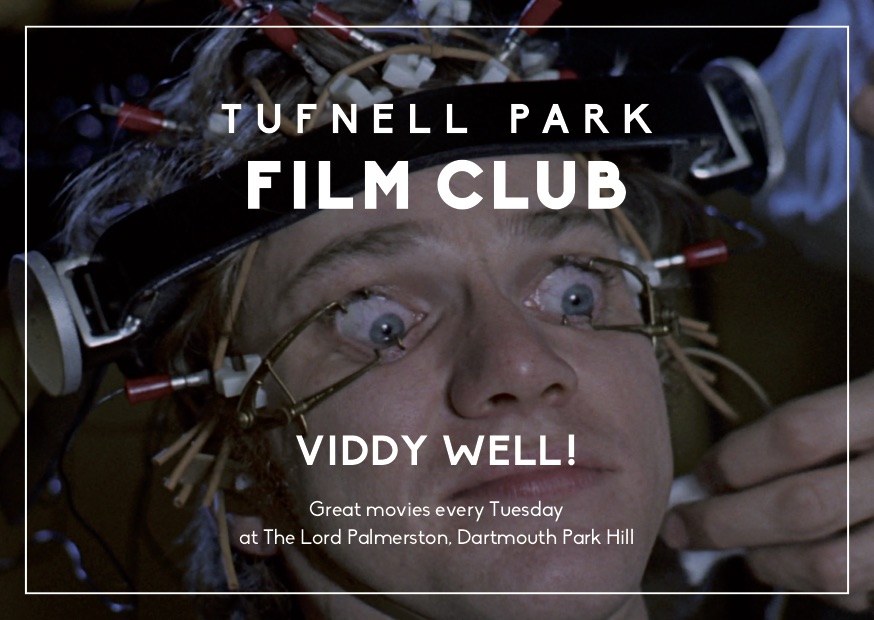I think of Tufnell Park Film Club as a sort of library. A community asset run on a shoestring with understated expertise, it quietly introduces people to each other and to films they may or may not have seen or heard of before. It’s also great value at just twenty quid a year for weekly screenings, an annual short film festival, a quarterly quiz and occasional director Q&As. Sometimes there’s cake. Members also get a discount on food at The Lord Palmerston, the pub in whose upstairs room the club meets.
I’m sure you could say the demographic is very North London, yet the film club’s membership is in other ways diverse to the point of quirky. Certainly it’s multi-generational. One of the oldest members was a refugee from Nazi Germany. There is the occasional amorous younger couple, plus parents, friends and siblings. Regulars have their preferred seats.
Like good librarians, founders Nigel Smith and Wayne Gooderham guide (and only sometimes direct) film choices by offering a themed selection on which members vote. That’s on what they call “chain” evenings, when each film is somehow connected to the previous one screened. These alternate with tribute screenings and other calendar specials such as Scalarama, Directed by Women or Pride London. Recently, for example, we’ve had Don’t Look Now and The Umbrellas of Cherbourg in tribute to director Nicholas Roeg and composer Michel Legrand, respectively. I’ve seen old favourites, classics I’d somehow previously missed and films I wouldn’t have gone to see if TPFC hadn’t made me give them a try.
I also credit the club with helping me feel connected. When I moved to my flat five years ago after 14 in my previous one I felt somewhat dislocated, even though I’d only migrated three miles. When I told new neighbours where I used to live, they responded, “It’s much nicer here”. I still laugh at this (pace @Zone1Bracket‘s World Cup of London Boroughs, Camden versus Islington is a pretty subtle distinction in the niceness stakes). But I did need something to make me feel at home after this change. The film club is somewhere local to go, alone or with friends, pre-booked or spontaneously, and where there’s a sense of belonging in a minimum fuss, no commitment London sort of way.
Nigel and Wayne take their inspiration from Billy Wilder: “I have ten commandments – the first nine are ‘thou shalt not bore’.” Members describe them as a great double act and say that this is one reason the club works so well. They themselves put their success down to the club “having a bit of personality” and offering a varied programme of consistently high quality. This in turn leads to them being trusted. Again, the library comparison seems apt.
From very small beginnings in 2012, TPFC has built up to a membership of over 250, of which around 100 typically attend once a month. Early screenings only attracted a dozen or so people, but most now are at full 40 seat capacity. There’s also a feeling of shared ownership – literally, on occasion. When equipment went missing during a recent pub refurb, members chipped in for replacements as well as paying for some extra chairs.
As a born and bred Londoner (and great great granddaughter of immigrants), I’ve always rejected any suggestion that London is intrinsically unfriendly or too big for a sense of community. Film clubs like ours – run by enthusiastic locals, to which everyone walks, and which has grown exponentially by word of mouth – put the lie to that.
In case you’re wondering:
Yes, I do have a favourite seat.
First film I saw at the club: A Streetcar Named Desire.
Favourite film so far in 2019: Satyajit Ray’s Mahangar (The Big City).
You can read the Tufnell Park Film Club Annual Review 2018 here. The Lord Palmerston is on Dartmouth Park Hill, which just happens to be the Islington-Camden border.
This blog was originally commissioned by London commentator Dave Hill and published as The Many Pleasures of the Tufnell Park Film Club on the OnLondon website.



